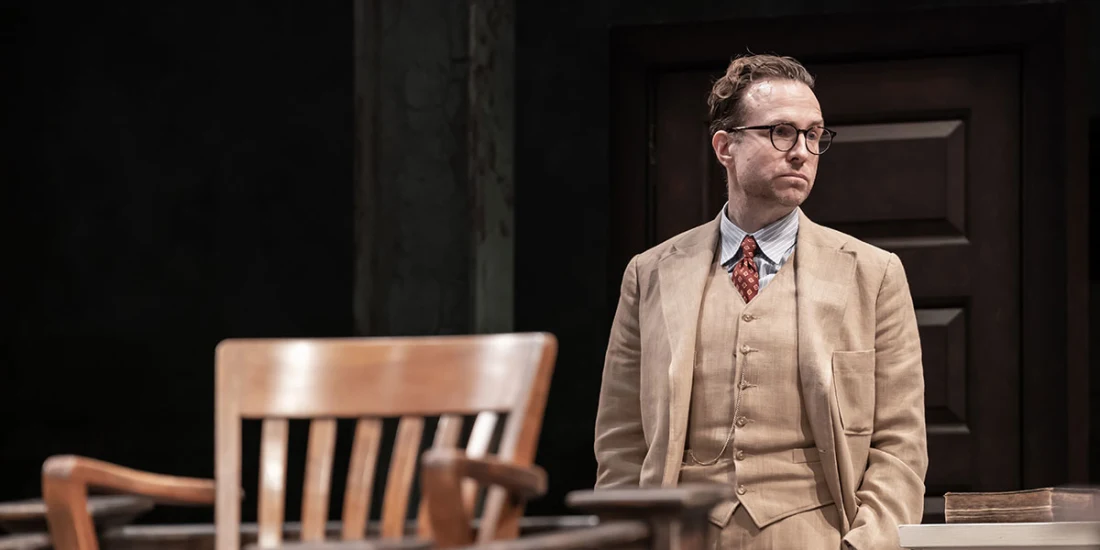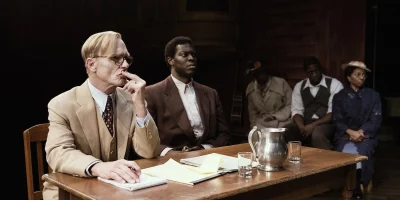
'To Kill a Mockingbird' review: Rafe Spall shines in Aaron Sorkin's stage adaptation
To Kill a Mockingbird is at the Gielgud Theatre to 19 November.
A time-honoured title, not least against expectation in the UK, gets a vigorous new lease on life in this West End reboot of To Kill A Mockingbird, a London transplant of the 2018 New York iteration that made headlines as the most commercially successful straight play in Broadway history.
Judging by its visceral appeal to a British audience, Harper Lee’s story of racial injustice in 1930s Alabama should resonate no less galvanically here, not least as refashioned by playwright Aaron Sorkin and director Bartlett Sher, and with a tremendous performance from Rafe Spall inheriting Gregory Peck’s screen role as Atticus Finch. (This novel has long been a stage mainstay in Britain, albeit in a separate adaptation that brought Robert Sean Leonard to London to play Atticus in 2013.)
Times have changed rather significantly since Jeff Daniels opened in this production Stateside, and Sorkin has cannily adjusted his script to capture the changing zeitgeist and a necessarily heightened awareness of racism and societal injustice.
The result more amply foregrounds the widower Atticus’s relationship with the family housekeeper Calpurnia (Pamela Nomvete) and, on this occasion anyway, rather side lines the narrative potential of Atticus’s daughter Scout, not least because Gwyneth Keyworth is still finding her footing in the role that brought Celia Keenan-Bolger a Tony Award.
Keyworth looks perfect for the child-woman required of an adult playing a young girl, but may perhaps be held back by accent issues that on this occasion are shared among one or two others in the cast.
I very much exclude from that line-up the pitch-perfect Spall and Nomvete – and, for that matter, recent drama school graduate Harry Redding, here making an impressive stage debut as Scout’s older brother, Jem (short for Jeremy, just as Scout is short for Jean-Louise).
And whereas Lee’s 1960 novel takes its sweet time getting to the trial, the courtroom exists at the thematic and physical centre of a production that shifts multiple locales with ease as Miriam Buether’s restless set slides this way and that to accommodate the domestic requirements of the material as well as its legal aspects.
Scout sets the scene, landing us in the rape trial of Tom Robinson (Jude Owusu), a 25-year-old Black man with three children who is put on the stand with Atticus in his corner and a hunched Mayella Ewell (Poppy Lee Friar) as the accused. Mayella’s father, Bob, is a snarling bigot played with full-throttle fury by the excellent Patrick O’Kane who, it’s intriguing to note, is also the cover for Atticus – which here gives new meaning to playing both sides of the fence.
“Conscience can be exhausting,” says Atticus, in one of the play’s key takeaway lines, and Spall’s great achievement is to locate a rumpled, creased authority within a potentially saintly character who is rescued here from unimpeachable rectitude, not least in a faceoff with Calpurnia that exposes even this upstanding lawyer’s limitations.
Speaking of “hasten(ing) the change,” Atticus here sounds at times like someone running for office, and it’s no surprise when mention is made near the start of a possible gubernatorial role for this character. I’m not sure Bob Ewell needs on this occasion to be classed as anti-Semitic amongst his other hateful characteristics: that feels in context like a step too far.
But Spall handles moral outrage with an understated command that invites empathy for this man on all fronts: a small-c crusader who puts decency first whilst acknowledging that no one, himself included, is without flaw. A cast the size of many a musical includes the award-winning David Moorst as Dill Harris, who fairly blatantly figures as comic relief, and the invaluable Jim Norton (himself a Tony and Olivier winner) in robust form as a notably keen-witted judge.
That nearly 90 years have passed between the era in which the play is set and today, with arguably very little having fundamentally changed, may give sorrowful pause: how are we to achieve that change which Atticus so movingly anticipates? As a richly emotional evening closes on the rending hymn “Joy Cometh in the Morning,” all one can and must do is look toward a better tomorrow and to those new and more just mornings that, with any luck, lie in wait.
Rafe Spall in To Kill a Mockingbird. (Photo by Marc Brenner)
Originally published on


